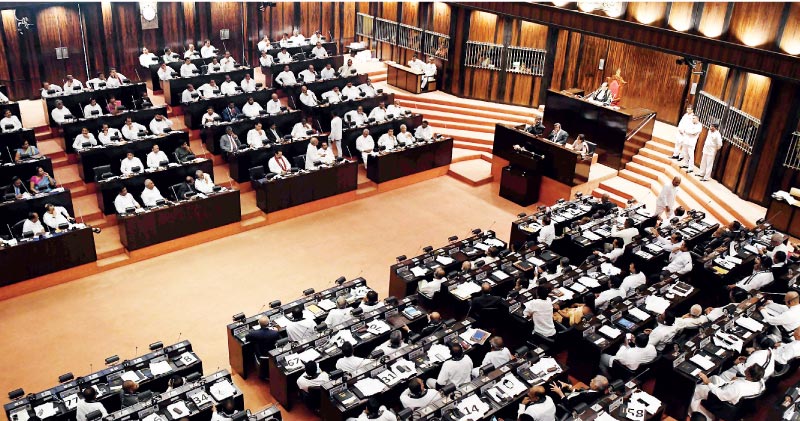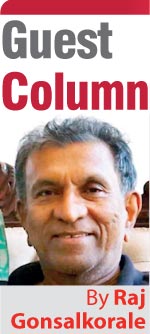Sunday Feb 22, 2026
Sunday Feb 22, 2026
Monday, 4 December 2023 00:00 - - {{hitsCtrl.values.hits}}

|
 Economic mismanagement by successive regimes made Sri Lanka bankrupt. Instead of proposing a collective self-reflection, analysing mistakes made and looking to the future than dwelling on the past, some politicians are throwing stones from glass houses and pretending they are fully clothed emperors.
Economic mismanagement by successive regimes made Sri Lanka bankrupt. Instead of proposing a collective self-reflection, analysing mistakes made and looking to the future than dwelling on the past, some politicians are throwing stones from glass houses and pretending they are fully clothed emperors.
It is common knowledge that the Sri Lankan bankruptcy was the culmination of economic misjudgement and mismanagement by successive regimes. Some politicians however do not think so although they too were complicit in this mismanagement.
While the Supreme Court in the country found that the leadership and senior economic managers of the Gotabaya Rajapaksa presidency breached public trust by not managing the economy of the country for the benefit and wellbeing of the country, the ruling referred to a specific fundamental rights case filed before the courts. It was in respect of the performance of the Gotabaya Rajapaksa presidency.
If one were to consider events prior to that, particularly, the performance of the regime previous to that, it is worth considering that between 2015 and 2019, the GDP growth rate had declined from nearly 7% to 2.7%, the debt to GDP ratio had increased from 75% to 96% and ISB borrowings had risen by $ 12 billion. The current Leader of the Opposition was a senior Minister in that regime and has to take collective responsibility for the economic performance of that regime.
Need to learn lessons from past mistakes
The issue for the future of the country however, is not about who is best at the blame game. It is about looking back at the mistakes made, and learning lessons from them so that such mistakes could be avoided in the future. If a survey is done to find out how many Sri Lankans have any confidence in the ability of politicians to manage the economy, the outcome would be very revealing. Judging by the exodus of Sri Lankans to greener pastures and even not so green pastures seeking a better future for them and their families, there cannot be any doubt as to what most Sri Lankans think of their political leaders.
The latest political show and finger pointing directed towards condemning one set of politicians by another set that smells an opportunity to gain votes and win elections, is another nail in the coffin of a disenchanted population.
Rather than playing the same political games, the opportunistic set of politicians could have looked to the future and perhaps asked a group of academics, economists, business leaders, and civil society leaders to examine the economic performance of regimes in power since the end of the war against the LTTE and identify the key areas of mismanagement and misjudgements so that they, and the public would know what should not be done in the future to make the Sri Lankan Titanic sink a second time. The post war period is mentioned as the country had suffered economically, politically, and socially for nearly three decades prior to 2009, leaving no grounds to justify a lack of economic performance since then.
The political parties could also undertake a self-reflection on the policies governing economic management and what changes are needed to avoid mistakes of the past. Most politicians in Parliament today have no understanding of economics and how local and global events impact the economy of the country.
They are driven by a major anomaly in the political structure of the country that is fundamentally short term in nature and practice. Economic planning spans a maximum of five years and is all about the next election and how the party in power could win the next election. The role of the Opposition is to throw as many obstacles as possible to prevent the party in power winning the next election.
The electorate, unfortunately, is also tuned to this scenario and vote for those offering short term relief not realising they are short term measures with negative consequences in the long term.
Planning should be undertaken by experts
Sri Lanka needs long term planning, not just economic planning but in other key areas such as education and health. Such planning should be undertaken by experts in the relevant fields and not by politicians and should be at least of 10 years duration, endorsed by all political parties after discussion among themselves and with each other. How well a political party in power performs in executing such plans should be the determinant at elections and not about major changes to the plans collectively agreed by all political parties.
Limits on borrowings and expenditure
In the area of economics, the long-term plan should specify limits on borrowings, both locally and internationally. There should be an agreement on taxation; personal, company, as well as indirect taxation. Strengthening tax collection measures is an operational issue and the responsibility of a political party in power, as expenditure on public programs, salaries, etc. would be dependent on tax revenue. Setting a limit on expenditure as a percentage of revenue should be an inclusion in the long-term economic plan.
Another key area that needs inclusion in the long-term planning process as well as legislatively, is a policy on how investments, foreign and local, are assessed with regard to the return on such investments. There have been accusations of creating “white elephants” using the country’s own financial resources as well as overseas borrowings and these could be avoided if a firm policy is in place by law to assess investments in major projects.
After 75 years of independence, Sri Lanka is not just economically bankrupt but also bankrupt in its education, health, and social outcomes. Many question whether the education policies are grooming the future generations to be the well-rounded, socially conscious citizenry and capable leaders that the country would need. Health services, at one time the envy of many neighbouring countries, have declined and health outcomes are deteriorating. The rich appear to be getting richer while the poor are getting poorer. The gap between these segments is widening.
Drug menace and crime
Some measures have been taken by the President and the Government to address major issues relating to corruption, the drug menace and crime. However, these are not sufficient judging by the fact that no one of consequence in the political hierarchy and the public service has been tried in the Courts to ascertain their guilt or otherwise, although the general belief in the country is that some have amassed vast amounts of wealth by illegal means. The drug menace seems to continue unabated according to reports of instances where drug hauls have been discovered, while the general view is that what is detected is just the tip of a vast iceberg.
The country has major issues that need addressing in order to overcome its economic and moral bankruptcy. Fiddling must stop if the country is to be saved.